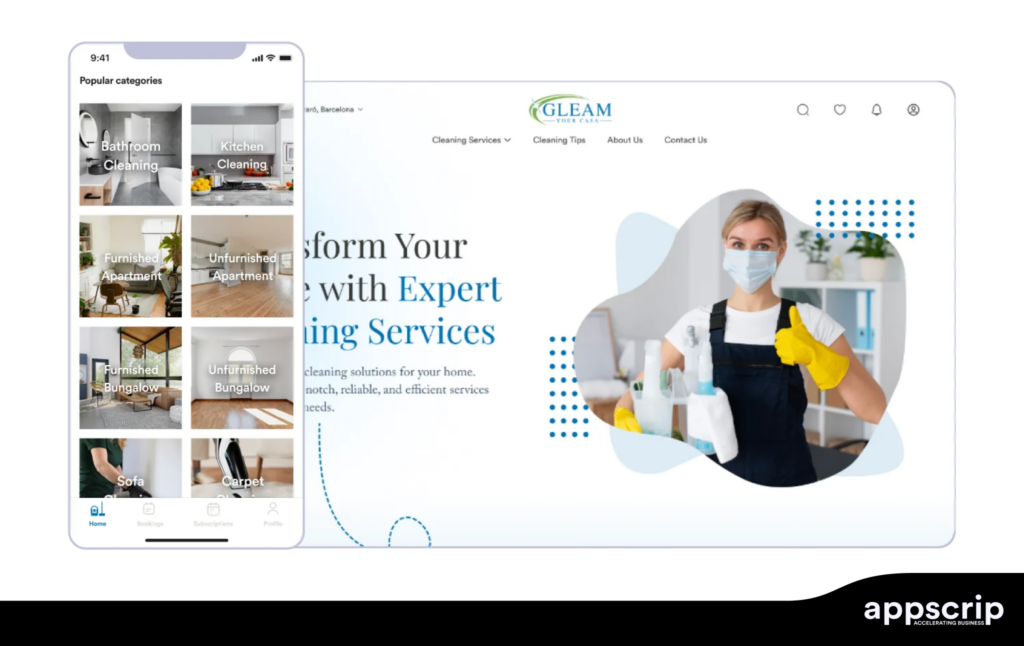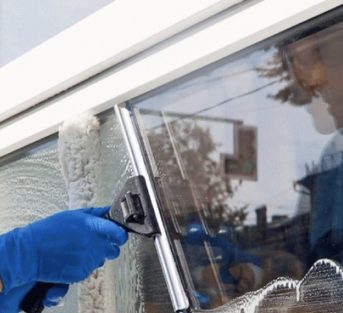The way to grow a cleaning business takes careful planning and execution. Whether you run a small cleaning business or a large-scale service, the correct methods can help you boost income, enhance client retention, and enter new markets. You can establish a thriving business that stands out in the competitive cleaning market by focusing on necessities such as strong marketing strategies, professional cleaning equipment, and technology-driven solutions.
In this blog, we look at effective strategies for expanding a cleaning business. From how to market your cleaning business to how to keep customers coming back, you’ll learn steps you can implement right away to change how your business works. Let’s dive into the details.
TL;DR
- Organize bookings, send reminders, and assign tasks with scheduling software to avoid errors and missed appointments.
- Simplify payments with secure systems that automate invoicing and track transactions effortlessly.
- Monitor employee productivity with GPS tools to ensure timely arrivals and identify areas for improvement.
- Use real-time updates to keep your team informed and operations running smoothly.
- Save time and reduce manual work with tools designed to streamline everyday tasks.
- Our software combines all these features to help you run your cleaning business more efficiently and focus on growth.
What Are the Steps to Start a Cleaning Business?
Step 1: Choose Your Cleaning Service Type
Begin by deciding on the type of cleaning services you wish to provide. Residential cleaning focuses on houses and apartments. Commercial cleaning focuses on offices, retail businesses, and industrial spaces. You can also focus on specific areas such as carpet cleaning, window washing, or post-construction cleanup.
See how much demand there is for these services in your area. If you identify a market gap, you might specialize in that area to attract more customers and establish a stronger reputation.
Step 2: Handle Legal Requirements
Setting up your business legally is essential. Choose and register a name that accurately represents your services. Choose a business structure, such as a sole proprietorship, partnership, or LLC, based on your requirements and liability choices.
Obtain all the licenses and permits required by your local and state authorities. These may include standard business licenses, hazardous material permits, or certificates for specific cleaning processes. Business insurance is also necessary. It protects your business from accidents, damages, and other liabilities. Clients typically feel more confident when employing a fully insured company, therefore it is a worthy investment.
Step 3: Invest in Tools and Equipment
Having the right tools and equipment is vital for delivering professional results. Residential cleaning requires essentials such as high-quality vacuums, mops, buckets, and eco-friendly cleaning products. Commercial cleaning often calls for the use of more modern instruments including industrial vacuums, floor scrubbers, and pressure washers. Remember to bring safety equipment, such as gloves and masks, to protect yourself and your teammates.
Technology can also make your operations more efficient. Appscrip’s cleaning services software simplifies many aspects of running a business with features like scheduling, live tracking, and secure payments, it helps you manage appointments, monitor staff, and provide a seamless experience for clients. These tools save time and help you focus on growing your business.
Step 4: Build Your Brand
Your brand represents how potential customers think about your business. Begin by selecting a memorable name and creating a professional logo. Create a simple website that includes your services, pricing, and contact information. A blog or tips section can also help to drive traffic to your website.
Use social media channels such as Facebook and Instagram to post updates, cleaning suggestions, and images of your work. Client testimonials and before-and-after photos can be very beneficial in demonstrating your competence and dependability. Customers will be more likely to locate and trust you if you have a strong internet presence.
Step 5: Start Small and Scale Gradually
Focus on a manageable number of clients at first to make sure you can give great service. Get feedback, figure out what you can do better, and build a good image during this time. To build your clientele organically, request reviews and referrals from satisfied customers.
As your business becomes more stable, consider expanding step by step. You can hire additional staff, introduce new services, or extend your operations to nearby areas. Scaling should be planned carefully to ensure you maintain high service quality and meet customer expectations. Always keep track of your finances and invest in tools that make scaling easier, such as scheduling software or advanced cleaning equipment.

What Tools and Equipment Are Essential for Cleaning Businesses?
Having the right tools and equipment is key to running a successful cleaning business. The items you need will depend on the type of cleaning you do, whether it’s homes, offices, or specialized services. Let’s break it down:
Basic Tools for Residential Cleaning
For home cleaning, you need simple tools to get the job done. These include:
- A good vacuum for carpets and hard floors.
- Mops and buckets for cleaning different types of floors.
- Microfiber cloths and sponges to clean surfaces and remove dust.
- Cleaning products that are safe for families and the environment.
- Gloves and masks to keep yourself safe while working.
Advanced Equipment for Commercial Cleaning
Cleaning large spaces like offices or stores requires heavy-duty equipment. Some useful tools are:
- Strong vacuums with extra suction power.
- Machines to scrub and polish floors.
- Pressure washers for tough outdoor stains.
- Large trash bins and sturdy garbage bags.
- Ladders for reaching high places like ceilings or windows.
Specialized Tools for Certain Services
If you focus on specific areas of cleaning, you may need specialized tools. For example:
- Steam cleaners to disinfect and remove deep stains.
- Carpet cleaning machines for a thorough clean.
- Window cleaning tools like squeegees.
- Industrial vacuums for post-construction cleanup.
Safety Equipment
Safety equipment is important for handling hazardous waste or places like manufacturing facilities. Make sure you and your team stay safe by using:
- Masks and gloves for handling cleaning chemicals.
- Shoes that don’t slip on wet surfaces.
- Goggles for protecting your eyes from debris or sprays.
Software to Stay Organized
Software can help you stay on top of your daily tasks. Scheduling tools make sure you never forget a job. Payment systems like POS help you get paid quickly and easily. Inventory tracking tools remind you to reorder supplies before you run out. Using these tools keeps everything organized and lets you focus on doing great work.
When you have the right tools and equipment, you can provide excellent service and build a solid reputation. Starting with the basics and adding advanced tools over time will set your business up for success.
How to Create a Business Plan for Your Cleaning Company
A solid business plan is the foundation of a successful cleaning company. It helps you organize your ideas, set goals, and prepare for challenges. Here is a guide to creating an effective plan for your business:
Step 1: Define Your Business Goals
Start by deciding what you want to achieve with your cleaning company. Do you want to focus on residential cleaning, commercial spaces, or specialized services? Set clear goals such as the number of clients you want to serve, the revenue you aim to generate, and the areas you want to cover. Having specific goals will guide your decisions as you grow.
Step 2: Understand Your Target Market
Conduct research on your ideal customers to better understand their preferences. For household cleaning, your target audience could be busy families or working professionals. Commercial clients may include office managers or business owners. Knowing your target audience can help you provide the appropriate services and set competitive prices.
Step 3: Outline Your Services
List all the services your business will provide. Be specific so that you can guide the clients better. For example, include details like regular cleaning, deep cleaning, or specialized tasks such as carpet cleaning or window washing. Clear descriptions make it easier for potential customers to know what to expect.
Step 4: Plan Your Budget
Estimate the costs of starting and running your business. This includes supplies, insurance, and marketing. Calculate how much you need to charge to cover your expenses and earn a profit. Make sure to leave room for expansion as your business grows.
Step 5: Create a Marketing Strategy
Decide how you will promote your business. Reach out to your target demographic through social media, local marketing, and word-of-mouth referrals. To increase customer loyalty, consider offering first-time discounts or referral bonuses. Establishing a strong online presence with a basic website and active social media profiles is important.
Step 6: Include Technology in Your Plan
Integrate tools that make running your business easier. Appscrip’s cleaning services software can help you manage bookings, communicate with clients, and track your team’s performance. Adding technology to your business plan shows you are prepared to operate efficiently.

Step 7: Set Milestones
Divide your goals into smaller steps and assign deadlines for each. For example, set a goal of acquiring five clients in the first month or generating a certain amount of revenue by the end of the first quarter. Tracking your progress will help you maintain focus and motivation.
Step 8: Prepare for Challenges
Think about potential challenges, such as competition or seasonal slowdowns, and plan how to handle them. For instance, you might offer seasonal promotions to attract clients during quieter times or focus on building long-term relationships with repeat customers.
How to Build a Loyal Customer Base for Your Cleaning Business
Having loyal customers is important for any cleaning business. These customers bring steady income and often recommend your services to others. Here are some simple ways to build strong relationships with your clients:
- Maintain The Quality of Work: Quality service is the backbone of loyalty. Make sure every job is done well, with attention to details and thorough cleaning. Arrive on time and ensure the space is spotless before leaving. Reliability builds trust and keeps clients coming back.
- Keep the Communication Clear: Clear communication helps avoid misunderstandings. Confirm appointments, inform clients of any changes or delays, and explain the services you will provide. When customers feel informed, they are more likely to trust your business.
- Reward Your Customers: A simple loyalty program can make clients feel appreciated. Offer discounts after a set number of cleanings or provide a free service as a reward for repeat business. Small rewards can go a long way in encouraging loyalty.
- Make Things Easy with Technology: Using solutions like Appscrip’s cleaning services software to make it easy for customers to book appointments, receive reminders, and pay for services. A smooth and convenient process helps create a positive experience that encourages customers to stick with you.
- Personalize Your Services: Get to know your clients and tailor your services to their needs. This could mean using their preferred cleaning products or addressing special requests. Personalized attention shows customers that you care about their satisfaction.
- Ask for Their Thoughts: Regularly ask clients for feedback on your services. Use short surveys or follow-up messages to understand what they like and what can be improved. Acting on their suggestions shows that their opinions matter to you.
- Build Real Connections: Treat your clients like people, not just transactions. Remember their preferences, greet them warmly, and thank them for their business. Small gestures like holiday cards or thank-you notes can help build lasting relationships.
- Focus on Keeping Your Customers: Retaining customers is often easier and more affordable than finding new ones. Offer fair pricing, maintain high-quality service, and show appreciation for their loyalty. Happy customers are likely to recommend your business to others.
What Are the Best Strategies to Automate Cleaning Business Operations?
Automating can make things easier while running a cleaning service business. By using simple tools and systems, you can save time, avoid mistakes, and keep your clients happy. Here are some easy ways to automate your cleaning business:
Implement Scheduling Software
Manually managing appointments often leads to errors and wasted time. Using a scheduling software helps to organize bookings, send reminders, and prevents double-booking. It also lets you quickly assign tasks to your team, ensuring everyone knows their responsibilities. With real-time updates, your staff stays informed, and no appointments are missed. This keeps your operations smooth and helps build trust with clients.
Integrate Payment Solutions
Clients want a simple and secure way to pay. Online payment systems let them use credit cards or digital wallets, making the process quick and hassle-free. When you connect your payment tools to your booking system, you can track transactions effortlessly. Automated invoicing and payment tracking reduce manual work and ensure timely payments. This setup saves time for both you and your clients, creating a more seamless experience.
Track Employee Productivity With Digital Tools
Keeping track of your team’s performance is essential for maintaining efficiency. GPS tracking tools show you if employees arrive at job sites on time and let you monitor how long tasks take. These insights help you identify areas where your team can improve. A system that combines location tracking with task updates keeps your staff accountable and ensures clients receive timely service. This level of oversight makes managing your team easier and improves overall performance.
How to Manage Finances to Ensure Business Profitability
Taking care of your finances is one of the most important parts of running a cleaning business. By tracking your income and expenses carefully, you can make better decisions and avoid financial troubles.
Monitor Costs and Maximize Profit Margins
- List Every Expense: Track all your costs, including supplies, employee wages, transportation, insurance, and equipment maintenance. Use a simple spreadsheet or an app to keep everything organized.
- Find Cost-Saving Opportunities: Look for bulk deals on cleaning supplies or negotiate better rates with your vendors. Even small savings add up over time.
- Track Profit Margins: Regularly calculate how much profit you’re making after covering expenses. If the margins are too low, review your spending to see where you can cut costs.
- Review Operational Efficiency: Identify tasks that take up extra time or money. Find ways to better manage these processes to reduce waste and improve overall profitability.
Develop Competitive and Profitable Pricing Strategies
- Research Competitor Pricing: Check what other cleaning businesses in your area are charging. This gives you a clear idea of market rates.
- Highlight Your Value: Base your prices not just on market rates, but on the quality and reliability of your services. Make sure clients understand why your services are worth the price.
- Offer Transparent Pricing: Clearly outline what’s included in your services. Avoid hidden fees to build trust with your clients.
- Test and Adjust Pricing: Periodically review your prices. If costs increase, adjust your rates accordingly to ensure you’re not losing money.
Prepare for Seasonal Demand Variations
- Save During Busy Seasons: Set aside extra income during peak months to cover expenses during slower periods. This helps you avoid cash flow problems.
- Create Seasonal Promotions: Offer discounts or special packages during slower months to attract more clients. For example, you could provide discounted holiday cleaning or spring-cleaning packages.
- Plan Work Schedules Ahead: During slow periods, adjust work hours or assign staff to training and maintenance tasks to keep them productive.
- Expand Seasonal Services: Consider adding seasonal services, like deep-cleaning for the holidays or post-party cleaning, to keep clients coming back.
How to Expand Your Cleaning Business Into New Markets
Growing your cleaning business into new areas can help you find more clients and increase your income. Here are some simple steps to help you expand:
Research New Markets
Check the Demand: Look for areas where people need cleaning services but don’t have many options. This will help you find the right place to grow.
Understand the Clients: Learn about the people or businesses in the new area. Are they families, offices, or stores? Adjust your services to match their needs.
Know the Rules: Make sure you understand the local laws and licenses needed to operate in the new market.
Build a Strong Team
Hire Reliable Staff: As your business grows, you’ll need more people to help. Look for workers who are dependable and good at their job.
Train Your Team: Teach your staff how to deliver top-quality cleaning services. Good training ensures they represent your business well in the new area.
Offer Services People Want
Add New Options: Offer services that are popular in the new market. For example, if businesses need after-hours cleaning, add that to your list.
Create Bundles: Combine services into packages that appeal to families or businesses. This makes it easier for clients to choose what they need.
Spread the Word
Advertise Locally: Use flyers, ads, or sponsorships to let people in the area know about your services.
Update Online Listings: Make sure your website and social media show that you’re now serving the new market. Post updates and share examples of your work.
Network with Locals: Meet with business owners or community groups to build connections and get referrals.
Frequently Asked Questions (FAQs)
How to Train Employees in the Cleaning Industry?
Teach employees the basics, like cleaning surfaces properly and using tools the right way. Explain safety rules clearly to help them handle chemicals and equipment safely. Use hands-on training to let employees practice while you supervise. Provide checklists to keep their work consistent. Schedule regular training sessions to introduce new cleaning methods or tools as they become available.
How to Handle Competition in the Cleaning Market?
Deliver top-quality services to keep clients loyal. Stay connected with customers and ask for feedback to show you value their opinions. Offer unique services, like eco-friendly cleaning or flexible scheduling, to stand out. Promote your business using social media, local ads, and word-of-mouth referrals. Use tools to streamline operations and give yourself more time to focus on improving services.
What Are the Benefits of Offering Green Cleaning Services?
Green cleaning attracts clients who prefer eco-friendly options. Non-toxic, biodegradable products keep families safe and protect the environment. Offering sustainable cleaning shows that you care about your clients and the planet, which builds trust. Green products can also save money because they sometimes last longer than traditional chemicals. Adding eco-friendly services helps you meet growing demand and stand out from competitors.
Conclusion
It takes time and a lot of effort to run a cleaning business, but if you concentrate on the right things, it’s easy. Delivering excellent service, staying organized, and paying attention to your clients’ demands go a long way toward establishing trust and loyalty. Whether you’re just getting started or trying to expand, consistently excellent service and solid planning can help your business thrive.
As your business grows, managing regular tasks can become stressful. Let the right tools assist you in this case. Cleaning services software makes scheduling, payments, and client communication easier, saving you time and effort.
Appscrip’s cleaning services software is intended to make your cleaning business work easier. It allows you to efficiently manage your operations and focus on what is most important. With the correct attitude and resources, you can create a cleaning company that stands out and keeps customers coming back. Let’s connect to know more about your business and solutions that help you grow!






